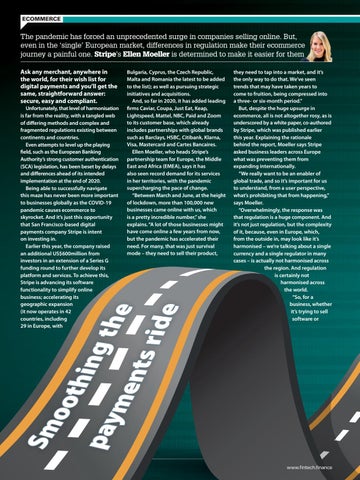ECOMMERCE
The pandemic has forced an unprecedented surge in companies selling online. But, even in the ‘single’ European market, differences in regulation make their ecommerce journey a painful one. Stripe’s Ellen Moeller is determined to make it easier for them Ask any merchant, anywhere in the world, for their wish list for digital payments and you’ll get the same, straightforward answer: secure, easy and compliant.
Sm oo thi ng pa the ym ent s ri de
Unfortunately, that level of harmonisation is far from the reality, with a tangled web of differing methods and complex and fragmented regulations existing between continents and countries. Even attempts to level up the playing field, such as the European Banking Authority’s strong customer authentication (SCA) legislation, has been beset by delays and differences ahead of its intended implementation at the end of 2020. Being able to successfully navigate this maze has never been more important to businesses globally as the COVID-19 pandemic causes ecommerce to skyrocket. And it’s just this opportunity that San Francisco-based digital payments company Stripe is intent on investing in. Earlier this year, the company raised an additional US$600million from investors in an extension of a Series G funding round to further develop its platform and services. To achieve this, Stripe is advancing its software functionality to simplify online business; accelerating its geographic expansion (it now operates in 42 countries, including 29 in Europe, with
Bulgaria, Cyprus, the Czech Republic, Malta and Romania the latest to be added to the list); as well as pursuing strategic initiatives and acquisitions. And, so far in 2020, it has added leading firms Caviar, Coupa, Just Eat, Keap, Lightspeed, Mattel, NBC, Paid and Zoom to its customer base, which already includes partnerships with global brands such as Barclays, HSBC, Citibank, Klarna, Visa, Mastercard and Cartes Bancaires. Ellen Moeller, who heads Stripe’s partnership team for Europe, the Middle East and Africa (EMEA), says it has also seen record demand for its services in her territories, with the pandemic supercharging the pace of change. “Between March and June, at the height of lockdown, more than 100,000 new businesses came online with us, which is a pretty incredible number,” she explains. “A lot of those businesses might have come online a few years from now, but the pandemic has accelerated their need. For many, that was just survival mode – they need to sell their product,
44
they need to tap into a market, and it’s the only way to do that. We’ve seen trends that may have taken years to come to fruition, being compressed into a three- or six-month period.” But, despite the huge upsurge in ecommerce, all is not altogether rosy, as is underscored by a white paper, co-authored by Stripe, which was published earlier this year. Explaining the rationale behind the report, Moeller says Stripe asked business leaders across Europe what was preventing them from expanding internationally. “We really want to be an enabler of global trade, and so it’s important for us to understand, from a user perspective, what’s prohibiting that from happening,” says Moeller. “Overwhelmingly, the response was that regulation is a huge component. And it’s not just regulation, but the complexity of it, because, even in Europe, which, from the outside in, may look like it’s harmonised – we’re talking about a single currency and a single regulator in many cases – is actually not harmonised across the region. And regulation is certainly not harmonised across the world. “So, for a business, whether it’s trying to sell software or
www.fintech.finance
